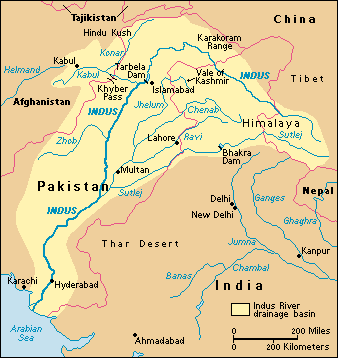The Challenge of Transboundary Waters.

Indus River Valley near Leh, India. (Click to the next screen and then click the expand arrow. It’s worth it.)
By KennyOMG (Own work) [CC-BY-SA-3.0 (http://creativecommons.org/licenses/by-sa/3.0)], via WikimediaCommons
“Water security” may not be common to the American lexicon, but to the US intelligence community, the United Nations, Asia, Africa and international organizations concerned with health, environment and human rights, it is as great a concern as economic development and national defense. Indeed, these issues are all inextricably linked.
On March 22, the United Nations organization UN-Water, chaired by Michel Jarraud, released its analytical brief, Water Security & the Global Water Agenda:
In the past few decades, definitions of security have moved beyond a limited focus on military risks and conflicts and have broadened to encompass a wide range of threats to security, with a particular focus on human security and its achievement through development. Water is best placed within this broader definition of security and acts as a central link across the range of securities, including political, health, economic, personal, food, energy, and environmental, among others.
Additionally, the World Economic Forum recently warned:
A wealthier, more populated and climate-variable world is rapidly becoming a more “water insecure” world. The world’s demand for fresh water is growing so fast that by 2030, agriculture, industry and rapidly expanding cities will face scarce supplies, thereby jeopardizing economic development while threatening political stability and public health.
The U.S. is not exempt from the reach of this grim forecast. A water insecure world portends difficult security risks for strategic allies and trading partners of the U.S. and, therefore, for the U.S. itself, according to the report Intelligence Community Assessment on Water Security released by the National Intelligence Council on March 22, 2012:
During the next 10 years, water problems will contribute to instability in states important to US national security interests. Water shortages, poor water quality, and floods by themselves are unlikely to result in state failure. However, water problems—when combined with poverty, social tensions, environmental degradation, ineffectual leadership, and weak political institutions—contribute to social disruptions that can result in state failure.
Though natural disasters, climate change, increasing populations and pollution are significant challenges to water security, the most daunting may be the geopolitical obstacles of waterways that traverse multiple nations, the “263 transboundary lake and river basins [that] cover nearly one half of the Earth’s land surface and account for an estimated 60 per cent of global freshwater flow,” as they were described by the 2008 UN-Water report, Transboundary Waters.
Pakistan is a case in point. It is profoundly dependent on the Indus River, the control of which has been an historical cause of discord with neighboring India. Though relatively little of the Indus flows through India, key upriver waters and Indus tributaries, and their dams, are under India’s control, and so too the fate of downriver Pakistan. The 1960 Indus Waters Treaty was signed by the two nations after 12 years of troubled negotiations that required the intervention of the World Bank. The Permanent Indus Water Commission, with representatives from each nation, oversees the treaty, but tensions and uncertainties continue.
An uneasy formula of conflict and cooperation has managed the shared water for drinking supplies, power generation, agriculture, fisheries, and industry. But some of the Indus is a shadow of its former self, as described in a 2011 National Geographic article:
Downstream provinces [of Pakistan] are already feeling the strain, with some dried-out areas being abandoned by fishermen and farmers forced to move to cities. That increases competition between urban and rural communities for water. “In areas where you used to have raging rivers, you have, essentially, streams or even puddles and not much else,” said [Michael] Kugelman [of the Woodrow Wilson International Center for Scholars].
A March 8, 2013 report by the International Union for the Conservation of Nature found:
The [Indus Waters Treaty] would seem to have become inadequate in its ability to address climatic variability and hydrological uncertainty; environmental flows; and the exigencies of growing demand, driven by significant increases in population.
This month, the United States Institute of Peace issued Understanding Pakistan’s Water-Security Nexus, which concluded:
Pakistan, a semiarid region and a primarily agricultural economy, is facing declining water availability and quality, growing water pollution, and overall environmental insecurity. This situation, coupled with institutional, operational, and governance failures, is fostering domestic discord. Water scarcity, floods, droughts, and domestic mismanagement can embitter interethnic relations and prompt political tension, which can in turn lead to violence.
The transboundary complexities of this entire piece of Asia are compounded by “countries that are unequal in size and power and have been involved in wars in the last six decades,” according to the non-profit organization International Rivers:
India’s trans-boundary riparian policies affect four countries – Pakistan, Nepal, Bhutan and Bangladesh – on three river systems – the Indus, the Ganga and the Brahmaputra-Mehgna. China’s riparian policies affect nine countries to the south – Pakistan, India, Nepal, Bangladesh, Myanmar, Laos, Thailand, Cambodia and Vietnam – on five river systems – the Indus, the Ganga, the Brahmaputra, the Salween and the Mekong
On an unexpectedly optimistic note, both UN-Water and the National Intelligence Council (NIC) find hope in the mutual dependence inherent in transboundary waters. “Water can serve as a potential entry point for peace and support sustainable cooperation among nations,” according to the NIC:
The Mekong Committee, established by Cambodia, Laos, Thailand, and Vietnam in 1957 exchanged data and information on the river basin throughout the Vietnam War. Israel and Jordan held secret “picnic table” talks to manage the Jordan River starting in 1953, even though they were officially at war from 1948 until 1994. The Indus River Commission survived two major wars between India and Pakistan.
And from the UN-Water brief:
Water-related challenges are compounded by the need to ensure coordination and dialogue between sovereign states, each with its own set of varied and sometimes competing interests. Numerous examples from across the globe demonstrate that shared waters provide opportunities for cooperation across nations and support political dialogue on broader issues such as regional economic integration, environmental conservation, and sustainable development. It is important to ensure that water security is achieved for all users, whether up or downstream, and does not come at the expense of water insecurity for some.
In future posts, we will explore in more detail the roles of the United Nations, the international community and United States foreign policy in global water security.











